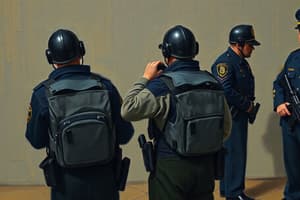Podcast
Questions and Answers
What behavior in a public place would NOT constitute causing a disturbance according to the text?
What behavior in a public place would NOT constitute causing a disturbance according to the text?
- Quietly reading a book (correct)
- Being drunk and shouting
- Exhibiting an indecent display
- Singing loudly and using obscene language
Who would NOT be considered guilty of an offence according to the text?
Who would NOT be considered guilty of an offence according to the text?
- A person who quietly walks through a public place (correct)
- An occupant of a dwelling-house who disturbs the peace of other occupants by disorderly conduct
- Someone who disturbs the peace of occupants by discharging firearms in a public place
- Someone who openly exposes an indecent exhibition in a public place
What action would NOT be considered loitering in a public place according to the text?
What action would NOT be considered loitering in a public place according to the text?
- Obstructing persons in the public place
- Standing still and observing the surroundings (correct)
- Sitting quietly on a bench
- Impeding or molesting other persons
What are the key areas covered by the Employment Standards Act (ESA) in Ontario?
What are the key areas covered by the Employment Standards Act (ESA) in Ontario?
What is the primary aim of the Labour Relations Act in Ontario?
What is the primary aim of the Labour Relations Act in Ontario?
What distinguishes hybrid offenses from indictable and summary conviction offenses under the Liquor License Act in Ontario?
What distinguishes hybrid offenses from indictable and summary conviction offenses under the Liquor License Act in Ontario?
What is considered an assault under the Criminal Code of Canada?
What is considered an assault under the Criminal Code of Canada?
What is included in the offense of criminal harassment under the Criminal Code of Canada?
What is included in the offense of criminal harassment under the Criminal Code of Canada?
What is the punishment for mischief causing actual danger to life under the Criminal Code of Canada?
What is the punishment for mischief causing actual danger to life under the Criminal Code of Canada?
Who is justified in using force if acting on reasonable grounds?
Who is justified in using force if acting on reasonable grounds?
In what situation is the use of force likely to cause death or grievous bodily harm justified?
In what situation is the use of force likely to cause death or grievous bodily harm justified?
Who must deliver the person to a peace officer immediately if they arrest without a warrant?
Who must deliver the person to a peace officer immediately if they arrest without a warrant?
Under what circumstances can personal information be disclosed without consent under PIPEDA?
Under what circumstances can personal information be disclosed without consent under PIPEDA?
What is a key requirement for companies regarding the personal information they collect under PIPEDA?
What is a key requirement for companies regarding the personal information they collect under PIPEDA?
What rights do employees have regarding their personal information under PIPEDA?
What rights do employees have regarding their personal information under PIPEDA?
Which of the following is a valid reason for disclosing personal information without consent under PIPEDA?
Which of the following is a valid reason for disclosing personal information without consent under PIPEDA?
What is one of the requirements for companies under PIPEDA regarding the personal information they collect?
What is one of the requirements for companies under PIPEDA regarding the personal information they collect?
What rights do employees have regarding their personal information under PIPEDA?
What rights do employees have regarding their personal information under PIPEDA?
Flashcards are hidden until you start studying
Study Notes
Arrest Without Warrant: Legal Authority and Use of Force
- Any person can arrest without a warrant if they find someone committing an indictable offense or have reasonable grounds to believe the person has committed a criminal offense and is escaping.
- Property owners or authorized persons can arrest without a warrant if they find someone committing a criminal offense on their property.
- Anyone other than a peace officer who arrests a person without a warrant must deliver the person to a peace officer immediately.
- Individuals required or authorized by law to enforce it, including private citizens, are justified in using force if acting on reasonable grounds.
- Persons executing a process or carrying out a sentence are justified if acting in good faith, even if the process or sentence is defective or issued without jurisdiction.
- Use of force likely to cause death or grievous bodily harm is not justified unless necessary to preserve oneself or others from such harm.
- A peace officer and anyone assisting them are justified in using force to prevent the escape of a person to be arrested, if the escape cannot be prevented by reasonable means in a less violent manner.
- Individuals authorized by law to use force are criminally responsible for any excess thereof.
- Everyone is justified in using force to prevent the commission of an offense likely to cause immediate and serious injury to a person or property.
- Those executing a process or making an arrest have a duty to have it with them and to give notice to the person being arrested, where feasible.
- Unlawfully assaulted individuals are justified in repelling force by force if not intended to cause death or grievous bodily harm and is necessary for self-defense.
- Individuals are justified in using force to defend themselves or others from assault, but not to willfully inflict excessive hurt or mischief.
Studying That Suits You
Use AI to generate personalized quizzes and flashcards to suit your learning preferences.




